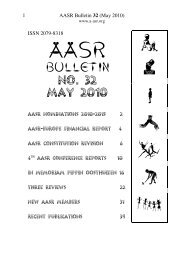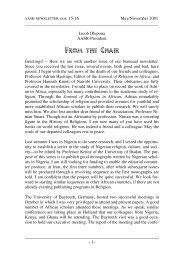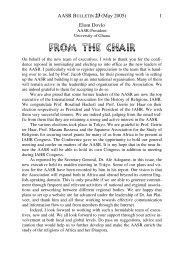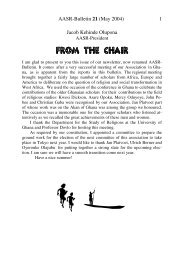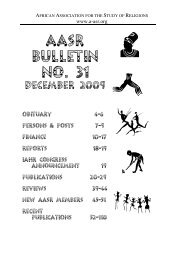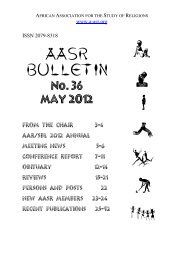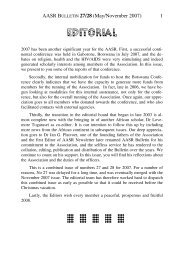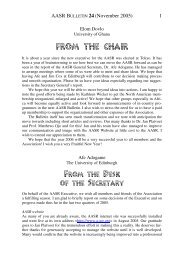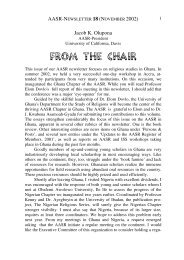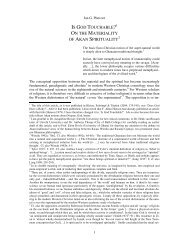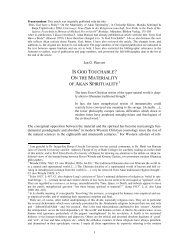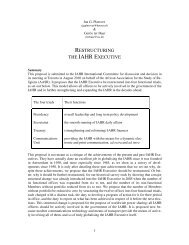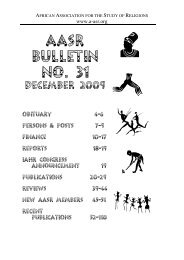AASR Bulletin 35 - The African Association for the Study of Religions
AASR Bulletin 35 - The African Association for the Study of Religions
AASR Bulletin 35 - The African Association for the Study of Religions
Create successful ePaper yourself
Turn your PDF publications into a flip-book with our unique Google optimized e-Paper software.
56<br />
<strong>AASR</strong> <strong>Bulletin</strong> <strong>35</strong> (November 2011)<br />
www.a-asr.org<br />
Morier-Genoud, Eric, 2007, ‘A Prospect <strong>of</strong> Secularization: Muslims and Political Power in Mozambique<br />
Today’, in Journal <strong>for</strong> Islamic Studies 27: 240-275<br />
[This article looks at Islam and politics in Mozambique. Islam has experienced <strong>the</strong>re an exemplary<br />
turnabout since <strong>the</strong> late 1980s. It has been trans<strong>for</strong>med from a marginalised, and at time<br />
oppressed, religion into a socially and publicly important faith. What have been <strong>the</strong> consequences<br />
<strong>of</strong> this trans<strong>for</strong>mation How did Muslims make use <strong>of</strong> <strong>the</strong>ir progress And what was<br />
<strong>the</strong> reaction <strong>of</strong> those in political power Did Muslims integrate into <strong>the</strong> elite in power, and can<br />
one consequently identify a reconfiguration <strong>of</strong> <strong>the</strong> national hegemonic bloc <strong>The</strong> article<br />
demonstrates that while Muslims were integrated in various political institutions after 1994,<br />
<strong>the</strong> party in power evicted all militant religious men from its party and from political positions<br />
after <strong>the</strong> year 2000. It only retained secular Muslims in its ranks. <strong>The</strong> text evaluates <strong>the</strong> impact<br />
<strong>of</strong> this change and raises <strong>the</strong> hypo<strong>the</strong>sis <strong>of</strong> a consequent secularization <strong>of</strong> politics.]<br />
Morier-Genoud, Eric & Wendy Urban-Mead (eds.) 2009, Marxism and Missions, special issue <strong>of</strong><br />
Social Sciences & Missions 22, 2.<br />
Morier-Genoud, Eric & Wendy Urban-Mead 2009, ‘Introduction’, in Morier-Genoud & Urban-<br />
Mead 2009: 127-130<br />
Murphy, Tim, 2007, ‘<strong>Religions</strong>wissenschaft as Colonialist Discourse: <strong>The</strong> Case <strong>of</strong> Rudolf Otto’, in<br />
Temenos 43, 1; full text at http://ojs.tsv.fi/index.php/temenos/index<br />
[<strong>The</strong> dominant approach to <strong>the</strong> study <strong>of</strong> religion known as <strong>the</strong> phenomenology <strong>of</strong> religion’s<br />
core assumption was that underlying <strong>the</strong> multiplicity <strong>of</strong> historical and geographically dispersed<br />
religions was an ultimately metaphysical, trans-historical substratum, called ‘man’, Geist,<br />
or ‘consciousness’. This transhistorical substratum is an expressive agent with a uni<strong>for</strong>m, essential<br />
nature. By reading <strong>the</strong> data <strong>of</strong> religion as its ‘expressions’, it is possible to sympa<strong>the</strong>tically<br />
understand <strong>the</strong>ir meaning. Geist, or ‘man’, <strong>the</strong>n, is both a philosophy <strong>of</strong> history and a<br />
hermeneutical <strong>the</strong>ory. It also <strong>for</strong>ms a systematic set <strong>of</strong> representations, which replicate <strong>the</strong><br />
structure <strong>of</strong> <strong>the</strong> asymmetrical relations between Europeans and those colonized by Europeans.<br />
<strong>The</strong> metanarrative <strong>of</strong> Geist is a narrative <strong>of</strong> <strong>the</strong> supremacy - <strong>the</strong>ir term, not mine - <strong>of</strong> white,<br />
Christian Europe over black, ‘primitive’ Africa and ‘despotic’ Asia. Spirit moves from <strong>the</strong><br />
South to <strong>the</strong> North; away from <strong>the</strong> East to <strong>the</strong> West. This paper locates Rudolf Otto’s work<br />
within <strong>the</strong> structure and history <strong>of</strong> phenomenological discourse and argues that <strong>the</strong> science <strong>of</strong><br />
religion as described <strong>the</strong>re con<strong>for</strong>ms nearly perfectly to <strong>the</strong> structures <strong>of</strong> colonial discourse as<br />
this has been discussed and analyzed by <strong>the</strong>orists such as Jacques Derrida and Edward Said.]<br />
Mwesigwa, Fred Sheldon, 2009, ‘Historical Context <strong>of</strong> Religious Conflict and Religious Education<br />
Curriculum’, in Alternation: Interdisciplinary Journal <strong>for</strong> <strong>the</strong> <strong>Study</strong> <strong>of</strong> <strong>the</strong> Arts and Humanities<br />
in Sou<strong>the</strong>rn Africa 16, 3: 55-67; full text at:<br />
http://alternation.ukzn.ac.za/docs/Alternation%20Spec%20Ed%203%20Pdfs/03%20Mwesigw<br />
a%20FIN%5B1%5D.pdf<br />
[<strong>The</strong> main intention <strong>of</strong> this paper is to examine <strong>the</strong> multi-religious nature <strong>of</strong> Ugandan society,<br />
<strong>the</strong> un-healthy relationship between members <strong>of</strong> <strong>the</strong> different religions, <strong>the</strong> limitations <strong>of</strong> <strong>the</strong><br />
current religious education (RE) curriculum to promote unity and harmony, Uganda’s<br />
cherished educational and political goal and finally <strong>the</strong> requisite need <strong>for</strong> curriculum review.<br />
<strong>The</strong> paper traces <strong>the</strong> failure to have a multi-religious ‘conscious’ RE education curriculum to<br />
<strong>the</strong> historical-political and religious conflicts that gave birth to a denominational and ‘divisive’<br />
educational system. <strong>The</strong> paper probes <strong>the</strong> religious landscape <strong>of</strong> Uganda and identifies<br />
and discusses key <strong>the</strong>oretical concepts that underpin <strong>the</strong> RE debate in Uganda. It establishes<br />
that Uganda is a multi-religious country that is dogged by religious discrimination and intolerance.<br />
Against this background, it criticises <strong>the</strong> promotion <strong>of</strong> a confessional CRE and IRE<br />
curriculum in religiously founded public schools by illustrating <strong>the</strong> limitation <strong>of</strong> CRE and IRE<br />
text-books in promoting unity and harmony. Finally, it recommends that curriculum review is<br />
<strong>the</strong> way to go. <strong>The</strong> main objective <strong>of</strong> a new curriculum should be to promote respect and<br />
tolerance and/ or understanding <strong>of</strong> o<strong>the</strong>r people’s religious traditions.]



